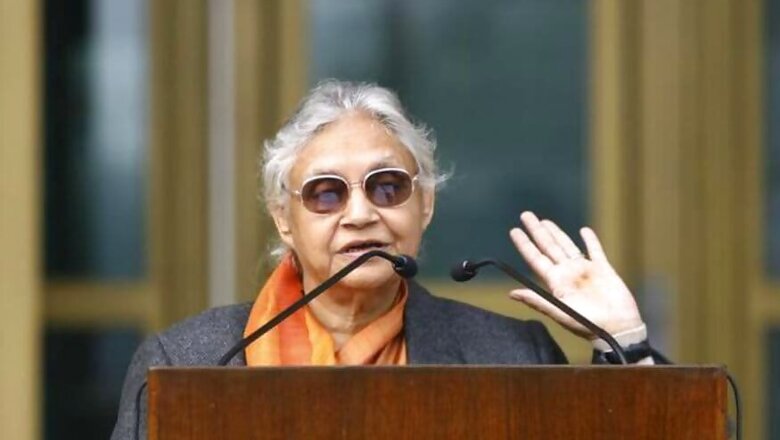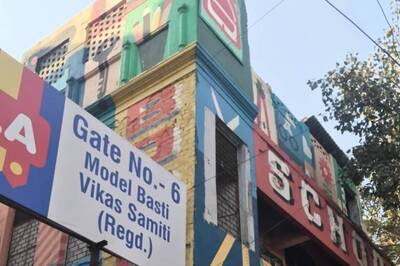
views
New Delhi: After appointing former chief minister Sheila Dikshit as Delhi Pradesh Congress Committee president, the grand old party has brought on board three working presidents – each from Muslim, Dalit and OBC communities – in a clear move to win back its traditional vote bank.
Set the stage for the 2019 Lok Sabha elections, the Congress on Thursday announced that Dikshit will have three deputies — Rajesh Lilothia, 48, Devender Yadav, 41, and Haroon Yusuf, 53.
The move has got political pundits thinking about how the identity play will pan out electorally.
Congress Made Mistakes, But Now in Right Direction, Say New Working Presidents
Lilothia says all three leaders have worked in Delhi for several years, and together as a team, they will strengthen the organisation and “channelise the energy positively for 2019 and 2020.”
While the caste and community-based identity politics is prevalent across states, in Delhi the upper caste accounts for 40 per cent and OBCs account for 24 per cent of the population. Dalits account for 17 per cent and Muslims 13 per cent of the state population.
The dent which the Aam Aadmi Party made in the Congress vote bank of Dalits and Muslims will be brought back, says a confident Lilothia. “There was a shift in our traditional vote bank towards other parties because of our mistakes. We admit that there was a gap between worker and leaders and we will now channelise it in the right direction and work like a family.”
Lilothia joined the Congress during his student years and became the president of the Student Welfare Association of Hansraj College, Delhi University. He has served as the chairman of SC/ST welfare board, district development board and Delhi Pradesh Youth Congress. He worked in Bihar as member of All India Congress Committee and was Delhi MLA from 2004 to 2013.
Echoing a similar sentiment is Haroon Yusuf, who plans to start work at the booth level. “This is a challenging assignment and we will start with strengthening the party at the booth level. We will set up the organisation first and then recurring issues like pollution will be pursued,” he says.
Yusuf, too, stepped into politics during his student days between 1979 and 1983. He was elected as the secretary of Delhi Pradesh Youth Congress and also served as the chairman of Anti-Narcotic Cell, All India Youth Congress Wing, in 1989. He was the chairman of Delhi Wakf Board from 1999 to 2004 and was re-elected for the fourth legislative assembly in 2008.
He was also the minister of Food and Supplies Department and Industries Department. It was during Yusuf’s tenure as the transport minister that red and green buses were introduced in the national capital. “Both the BJP and AAP are issuing statements for doing nothing on the issues that are troubling Delhi,” Yusuf says.
Yadav, the third deputy, joins Yusuf in slamming the two parties, saying, “The ‘sapno ke saudagar’ have been exposed (Parties that sell dreams to mislead people have been exposed).”
Yadav sees his teaming up with Lilothia and Yusuf along with Dikshit as a “combination of youth and experience.” A Rajasthan co-incharge, he was earlier a member of the legislative assembly from Badli constituency in Delhi from 2008-2013 and 2013-15. He was defeated by Ajesh Yadav of AAP in the Delhi Elections 2015.
All three leaders are committed to establishing contact with party workers to win back the vote bank in Delhi.
Will the Formula Bring Results?
Congress’ decision of choosing minority leaders as working presidents of the Delhi Pradesh Congress Committee has got political experts convinced that the party is attempting to evolve a strong leadership among the OBCs, SC/STs and Muslims ahead of the general elections.
Earlier, there used to be only one president and others followed. Now, with three working presidents from different communities in Congress, we will see them compete with each other to carve their leadership,” says Prakash Singh, professor of political science, Delhi University.
In his opinion, the experiment can backfire due to the deputies’ competitiveness to establish themselves as leaders. “They are young and to establish themselves they might do something which maybe contrasting to other leaders of the Congress. In this milieu, Lilothia has a good chance to shine as the Dalit population supports him,” Singh says.
Caste of minimal significance in the capital because here “the aspirations are different”. “People come here for jobs and development-related concerns,” he points out.
Singh said that in Delhi, the BJP and Congress earlier didn’t develop leadership based on caste but will now do so.
Surinder S Jodhka, professor of sociology at JNU, says that Delhi is different from other states as it has a large floating population of migrants and a native Dalit population. “The Congress move is symbolic of inclusiveness with which the party is trying to bring back the traditional vote bank of Dalits and Muslims. They have roped in Sheila Dikshit to get the support of middle class.”




















Comments
0 comment